Mr. Terrell realized his audiences were eager to see more of their favorite folk singers in person, on stage. To accommodate, he expanded the concert scheduling to Sunday afternoons too, usually at four o'clock.
American Folk Song Festival
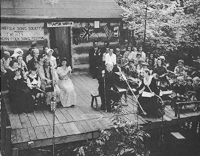
Monday, July 23, 1962
Inspired by a traditional mountain "Singin' Gatherin'" (wherein musicians got together to perform old songs) Jean Thomas staged a small folk festival for a group of invited guests at her home in September 1930. Featured performers included Setters and Dorothy Gordon, a singer from New York. Thomas incorporated the American Folk Song Society the following year to plan for an annual festival near her hometown of Ashland, Kentucky.
The festival followed an unwavering script for many years, intended to show "authentic sequences in America's musical history." Volna Fraley or, later, his nephew, would signal the start of the performances by blowing a fox horn that had belonged to "Devil Anse" Hatfield (patriarch of the legendary feuding family of the Kentucky-West Virginia border). Next, a man, woman, and two children would arrive at the stage by covered wagon to be greeted by a woman dressed as a Cherokee Indian, as a representation of the Anglo-American settlement of the Appalachian Mountains.
Musicians would play traditional stringed instruments such as dulcimer, fiddle, guitar, banjo, and accordion, plus recorder and mouth harp. Homemade varieties, such as fiddles constructed out of corn stalks, and banjos made from gourds, appeared alongside later models.
Leon Bibb
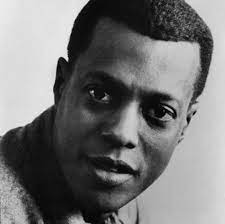
The son of a postal worker, Charles Leon Aurthello Bibb was born in Louisville, KY., on Feb. 7, 1922. Bibb left Louisville after college to serve in the Army Air Forces. He was an actor and folk singer who grew up under segregation, found mainstream favor on the "The Ed Sullivan Show" and sang with Joan Baez and Harry Belafonte on the civil rights trail. He became firmly established on the folk-singing circuit. "I only moved into folk music because a black actor couldn't get a job on Broadway," Bibb said in the New York Times interview. In 1959 he performed at the first Newport Folk Festival and was signed by Vanguard, which featured him on several albums, including Leon Bibb Sings Folk Songs.
A stirring baritone who learned to sing in church choirs, Bibb made his Broadway debut in 1946 in the chorus of "Annie Get Your Gun," with Ethel Merman. and was seen as Jim in "Livin' the Life," a musical based on "The Adventures of Huckleberry Finn." He also toured with "Finian's Rainbow" and was directed by Elia Kazan in "Flight into Egypt," with Zero Mostel. In 1966 he was one of eight black actors, including Cicely Tyson and James Earl Jones, in "A Hand Is on the Gate," which combined the poetry of such writers as Langston Hughes and Gwendolyn Brooks with Negro spirituals and other songs. He earned a Tony nomination in 1967 for his performance, but it was Bibb's last Broadway show. Later he was featured on the television show "Hootenanny." He also made two movies with Sidney Poitier, For Love of Ivy (1968) and The Lost Man (1969).
While in his adopted hometown of Vancouver, Canada, Bibb produced and performed in a number of stage and television shows—including "One More Stop on the Freedom Train." That musical—about the underground railroad journey of black slaves to Canada—was originally presented at Expo 86.
Bibb is well-known for helping establish the success of Vancouver's Arts Club Theatre. He co-produced and performed in the Arts Club Theatre's seven-month-long run of "Jacques Brel is Alive and Well and Living in Paris." He also created A Step Ahead, the anti-racism school program that has been presented in both elementary and secondary schools throughout B.C. and Canada for more than 20 years.
Mr. Bibb died Oct. 23, 2015 in Vancouver, Canada at the age of 93.
Theodore Bikel
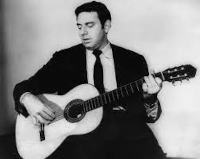
Born Theodore Meir Bikel in May of 1924 in Vienna, Austria, Bikel fled Austria following the Nazi occupation. He was raised in Palestine and acting at the Hebrew national theatre. In 1945, at the age of 21, he left Palestine to study at the Royal Academy of Dramatic Arts in London.
In 1951, Bikel made his first film debut in The African Queen. In 1954, he immigrated to the United States, becoming a naturalized citizen seven years later. Bikel appeared in many popular television series including, "The Du Pont Show of the Month." In 1958, Bikel was nominated for an Academy Award for his role as the Southern Sheriff in the film, The Defiant Ones.
Bikel was also a successful singer and performed in concerts around the world. A few of his popular albums include Israeli Folk Songs (1955) and Silent No More (1972).
Eventually, it was Bikel's singing career which directed him to Broadway. In 1959, he performed in the original Broadway cast of "The Sound of Music," where he played Captain Georg Von Trapp. Then in 1969, Bikel starred in the original run of "Fiddler On the Roof," as Tevye. Since then, Bikel has performed the role of Tevye, more than any other actor. In 1959, Bikel co-founded, with Pete Seeger and George Wein, the Newport Folk Festival.
He passed away on July 21, 2015 in his home.
The Clancy Brothers and Tommy Makem
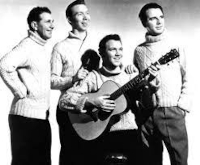
and Tommy Makem
The Clancy Brothers were an influential Irish folk music group that developed initially as a part of the American folk music revival. Most popular during the 1960s, they were famed for their Aran jumper sweaters and are widely credited with popularising Irish traditional music in the United States and revitalising it in Ireland, contributing to an Irish folk boom with groups like the Dubliners and the Wolfe Tones.
The Clancy Brothers, Patrick "Paddy" Clancy, Tom Clancy, and Liam Clancy, are known best for their work with Tommy Makem, recording almost two dozen albums together as The Clancy Brothers and Tommy Makem. Makem left in 1969, the first of many changes in the group's membership. The most notable subsequent member to join was the fourth Clancy brother, Bobby. The group continued in various formations until Paddy Clancy's death in 1998.
Richard Dyer-Bennet
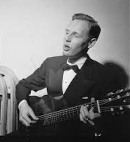
Richard Dyer-Bennet (1913-1991), a major figure in the folk music revival of the 1940s-1970s, performed English ballads and European and American folk songs, blending indigenous rural and traditional materials with a unique musicality and urban artistry.
Dissatisfied with his earlier recordings, Dyer-Bennet founded his own record company, in partnership with Harvey Cort, in 1955 to ensure that his recordings would truly reproduce his voice and guitar as they sounded in live performance and that the songs on each record would be grouped as on his concert programs.
Dyer-Bennet Records were released to high critical acclaim. All fifteen albums in the collection were acquired for pressing and distribution by the Center for Folklife and Cultural Heritage in 1995.
Richie Havens
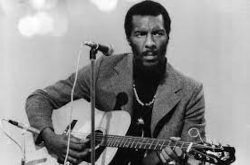
From the beginning, when he played Village folk clubs in the mid-Sixties, Havens stood out due to more than just his imposing height (he was six-and-a-half feet tall) and his ethnicity (African-American in a largely white folk scene). He played his acoustic guitar with an open tuning and in a fervent, rhythmic style, and he sang in a sonorous, gravel-road voice that connected folk, blues and gospel.
The oldest of nine children, Havens grew up in Brooklyn and left home at 17 and landed in Greenwich Village. After recording two albums for a small label, Havens hooked up with Bob Dylan's manager, Albert Grossman. With that, Havens' visibility jumped up a new notches. In 1966, Havens was signed to Verve/Folkways. Havens already had a growing audience thanks to albums like 1968's ambitious blues-folk-psychedelic double LP, Richard P. Havens.
Havens wasn't supposed to be the first act to open the festival; that slot originally was intended for the band Sweetwater, but that band wound up being stuck in traffic. Backstage, co-organizer Michael Lang approached Havens and practically begged him to go on instead. "It had to be Richie—I knew he could handle it," Lang later wrote. Recalling his trip into the grounds by helicopter, he later said, "It was awesome, like double Times Square on New Year's Eve in perfect daylight with no walls or buildings to hold people in place."
After performing a half-dozen songs, Havens ran out of material—until, he later said, he remembered "that word I kept hearing while I looked over the crowd in my first moments onstage. The word was: freedom." Havens began chanting that word over and over, backed by his second guitarist and conga player, and eventually segued into the gospel song "Sometimes I Feel Like a Motherless Child," which he had heard in church as a child. The combined, surging medley wasn't just a crowd-pleaser; it later became a highlight of the Woodstock movie, which also immortalized Havens' orange dashiki. (What many didn't know at the time was that Havens wore dentures, which also gave his singing voice a unique tone.) "My fondest memory was realizing that I was seeing something I never thought I'd ever see in my lifetime—an assemblage of such numbers of people who had the same spirit and consciousness," he later recalled of Woodstock to Rolling Stone.
In the years after Woodstock, Havens maintained his momentum, finally scoring a top 20 hit in 1971 with a version of George Harrison's "Here Comes the Sun."
Richie Havens, who brought an earthy soulfulness to the folk scene of the Sixties and was the first act to hit the stage at Woodstock, died of a heart attack on Monday, April 22. He was 72 and was living in Jersey City, New Jersey.
Ian and Sylvia
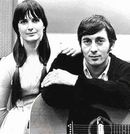
Sunday, August 3, 1969
Ian said, "I could never match Dylan's output. For every good song I wrote, he wrote eight." They recorded folk-based albums and made popular the songs of fellow Canadian Gordon Lightfoot including Early Morning Rain and For Lovin' Me. Ian wrote about migrant workers in Four Strong Winds, later recorded by Neil Young, and about a rodeo from a girl's point of view in Someday Soon, beautifully recorded by Judy Collins. Fricker wrote You Were On My Mind, a US hit for We Five and a UK one for Crispian St Peters. By the end of the '60s, they went electric and formed a folk/rock group, Great Speckled Bird, and the album of the same name was The Great Speckled Bird (1969) produced by Todd Rundgren.
The Limeliters
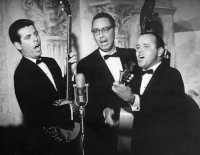
The Limeliters are an American folk music group, formed in July 1959 by Lou Gottlieb (bass violin/bass), Alex Hassilev (banjo/baritone), and Glenn Yarbrough (guitar/tenor). The group was active from 1959 until 1965, and then after a hiatus of sixteen years, Yarbrough, Hassilev, and Gottlieb reunited and began performing again as The Limeliters in reunion tours. On a regular basis a continuation The Limeliters group is still active and performing. Gottlieb died in 1996 (age 72), Yarbrough died in 2016 (age 86), and Hassilev (born 1932), the last founding member, who had remained active in the group, retired in 2006, leaving the group to carry on without any of the original members.
The Chad Mitchell Trio
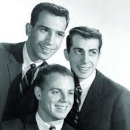
The Chad Mitchell Trio was a Pop-folk group, organized in Spokane, Washington, in 1958, and very popular on the college campus circuit for several years thereafter. The original members were Chad Mitchell, Mike Kobluck and Mike Pugh, who left after they recorded one album ("The Chad Mitchell Trio Arrives" on Colpix Records). After auditioning many singers, they chose Joe Frazier (not to be confused with the prizefighter) to replace Pugh and the most well-known version of the trio was formed.
When Mitchell left the group in 1964 to pursue a solo career, he was replaced by a young John Denver and the group became known thereafter as the Mitchell Trio. Later Frazier left and was replaced by David Boise. When Kobluk left he was replaced by Michael Johnson (who had some success as a solo artist later on). Due to contractual reasons, the Mitchell name could no longer be used after the last original member left. The new group was called simply Denver, Boise and Johnson. Roger McGuinn (then called Jim McGuinn), later of The Byrds, was the Chad Mitchell Trio's accompanist for several years. They recorded for various labels, most notably Colpix, Kapp and Mercury In the late 1980s the group reunited for a charity performance in Spokane and have continued to work together periodically ever since.
The New Christy Minstrels
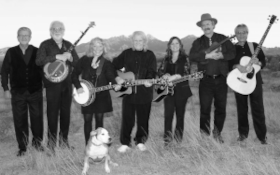
Formed in 1961, with a name borrowed from a mid-19thcentury musical performance ensemble formed by Edwin Pearce Christy, has had a succession of members over time, many of whom went on to solo career fame. But importantly, founder Randy Sparks has remained its leader and center for six decades.
The group's discography includes enduring classics, some written by Sparks and others are covers of the work of other writers. They include 29 albums. Those albums contained some of their greatest hit singles, including "This Land is Your Land" (1962), "Green, Green" (1962), "Today" (1964); and "Silly Ol' Summertime" (1964).
Characteristic of the group's repertoire is how many of its songs were written by Sparks or were his adaptations of folk music classics. Of the latter of these was Woody Guthrie's "This Land is Your Land," which brought it to the pop singles charts in 1962, about two decades after Guthrie first released it as a protest song. Several other artists (Peter, Paul and Mary, The Kingston Trio, Trini Lopez, et al.) followed suit as folk music found new relevancy in the turbulent 1960s.
Accolades to The New Christy Minstrels came early and often. In addition to ranking singles on the pop charts in the early-to-mid 1960s ("Green, Green," "Today," "Denver," "This Land is Your Land"), and record sales in the millions, the debut album "Presenting the New Christy Minstrels" won a Grammy Award in 1963.
Still performing in 2019, Sparks and the current singers find welcome audiences around the world and at home in the United States...from California to the New York island.
Phil Ochs
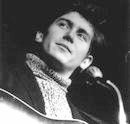
Philip David Ochs, December 19, 1940 - April 9, 1976, was an American protest singer and songwriter who was known for his sharp wit, sardonic humor, political activism, often alliterative lyrics, and distinctive voice. He wrote hundreds of songs in the 1960s and 1970s and released eight albums.
Ochs was a self-coined "singing journalist" when he began performing in New York in the early '60s. Like Bob Dylan, the rival who always outpaced him, Ochs made his reputation singing topical protest songs. He stayed with them much longer than Dylan (and indeed would never really abandon them), but eventually he too would follow Dylan into electric music and more personal, abstract, and romantic compositions.
music.msn.com/
Photo Source: cs.pdx.edu/~trent/ochs/
Odetta
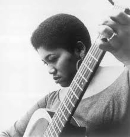
Odetta Holmes (December 31, 1930 - December 2, 2008), known as Odetta, was an American singer, actress, guitarist, lyricist, and a civil and human rights activist, often referred to as "The Voice of the Civil Rights Movement." Her musical repertoire consisted largely of American folk music, blues, jazz, and spirituals. An important figure in the American folk music revival of the 1950s and 1960s, she influenced many of the key figures of the folk-revival of that time, including Bob Dylan, Joan Baez, Mavis Staples, and Janis Joplin. Time magazine included her recording of "Take This Hammer" on its list of the 100 Greatest Popular Songs, stating that "Rosa Parks was her No. 1 fan, and Martin Luther King Jr. called her the queen of American folk music."
Peter, Paul, and Mary
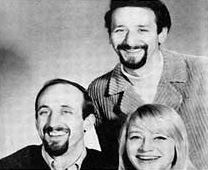
Peter, Paul and Mary (often PP&M) is one of the most successful folk-singing groups of the 1960s. The trio comprised Peter Yarrow, Noel "Paul" Stookey, and Mary Travers.
The group was created by producer Albert Goldman, who sought to create a folk "supergroup" by bringing together "a tall blonde (Travers), a funny guy (Stookey), and a good looking guy (Yarrow)". He launched the group in 1961, booking them into the Bitter End, a coffee shop in New York City's Greenwich Village that was a favorite place to hear folk artists. The group recorded their first album, Peter, Paul and Mary, the following year. The album was listed on Billboard Magazine Top Ten list for ten months and in the top one hundred for over three years.
By 1963, they had recorded three albums, released the now-famous song Puff the Magic Dragon, which Yarrow originally wrote in 1958, and performed another major hit, their cover of If I Had a Hammer at the March on Washington, best remembered for Reverend Martin Luther King, Jr.'s "I Have a Dream" speech. For many years after, the group was at the forefront of the civil rights movement and other causes promoting social justice. The later hit Leaving on a Jet Plane was actually written by the then unknown John Denver.
The trio broke up in 1970 to pursue separate solo careers, but none had a fraction of the success they did as a group, although Stookey's The Wedding Song (There Is Love) (written for Yarrow's marriage to Marybeth McCarthy, the niece of senator Eugene McCarthy) has become a wedding standard since its 1971 release and was a hit. In 1978, they reunited for a concert to protest nuclear energy, and have recorded albums together and toured since. They currently play around 40 shows a year.
The group was inducted into the Vocal Group Hall of Fame in 1999.
In 2005, Travers was diagnosed with Lukemia, leading to the cancellation of the remaining tour dates for that year.
Pete Seeger
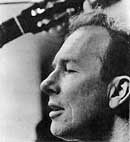
Sunday, August 2, 1964
In addition to being America's best-loved folksinger and an untiring environmentalist, Pete Seeger is a national treasure. He has been at the forefront of the labor movement, the struggle for Civil Rights, the peace and anti-war movements, and the fight for a clean world. He has been a beacon for hope for millions of people all over the world. Once blacklisted from national television for being unafraid to voice his opinions, he was given the nation's highest artistic honors at the Kennedy Center in December 1994. In January 1996 he was inducted into the Rock and Roll Hall of Fame.
Source: home.earthlink.net/~jimcapaldi/
The Tarriers
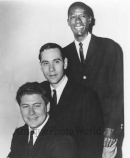
The Tarriers recorded "Tom Dooley" on their debut album in 1957, a year before the song became a massive hit for the Kingston Trio. The group also released and had a minor hit with "The Banana Boat Song," before Harry Belafonte recorded the same song and started the calypso craze. Despite the talent of Erik Darling, Alan Arkin, and Bob Carey, the Tarriers never received credit for their originality, nor found a niche in the bourgeoning folk boom of the late '50 and early '60s.
Darling put together several combinations in the early to mid-50s, hoping to emulate the success of the Weavers. He formed a group called the Tunetellers with Bob Carey, Carl Carlton, Al Wood, and Ray Yavneh, but an ill-fated appearance at the Circle in the Square Theatre brought a quick end to the partnership. Darling, Carey, and Carlton regrouped with Alan Arkin and named their group after the Irish folk song "Drill, Ye Tarriers, Drill." Former Weavers' manager Pete Kameron worked to find the band a recording contract, but the major labels initially showed no interest. The band dissolved and re-formed without Carlton, then polished their live act in New York's Catskill Mountains.
In the fall of 1956, the Tarriers recorded their first tracks in a Manhattan studio for Glory Records. The sessions produced "The Banana Boat Song," a calypso-influenced piece that Darling had first heard from Bob Gibson in Washington Square. While the song reached number four on Billboard, RCA quickly grabbed the song for inclusion on Belafonte's new album. The Tarriers returned to the studio in 1957 to record additional tracks for their self-titled debut, and released "Those Brown Eyes," "Pretty Boy," and "Quinto" as follow-up singles. When these singles failed to chart, Glory allowed the year-long contract to lapse.
The group launched a European tour in 1957, playing a number of dates at the Olympia Theater in Paris and releasing a live set on a French record label. Despite this success, Arkin opted to leave the group and was replaced by Clarence Cooper. The Tarriers recorded a second studio effort tilted Hard Travelin' for United Artists in 1959, but the album failed to find an audience. Darling's talent was nonetheless recognized by Fred Hellerman, who invited him to take part in the Weavers' next rehearsal. Throughout 1959, Darling juggled his career between the two bands until scheduling conflicts led to his departure from the Tarriers.
After Eric Weissberg joined the Tarriers, the band recorded Tell the World About This for Atlantic Records. Internal problems began to threaten the group, however. Carey became less reliable and Marshall Brickman was hired as a standby in case he failed to show. In 1963, Carey was booted from the group. In the spring of 1964 when Weissberg departed for National Guard duty, the group temporarily disbanded. When he returned, the band re-formed with Al Dana replacing Brickman and in 1965, joined Judy Collins on a tour of Poland and Russia. After the tour, the Tarriers fizzled out.
The Tarriers left behind a handful of worthy folk recordings and in a number of ways, were ahead of their time. Other groups would emulate the arrangements and song choices with greater success. The presence of Carey, an African American, and later Cooper, also expressed a racial diversity that was unusual, especially during the early part of the revival. "...The original Tarriers brought folk music to the American Hit Parade on its own uncompromised terms," wrote Dave Samuelson. "Its success helped pave the way for the Easy Riders, the Kingston Trio, and many other acts to follow." In 2001, Folk Era re-issued the band's debut along with a number of live tracks.
The Weavers

The Weavers were an American folk music quartet based out of the Greenwich Village area in New York City. They sang traditional folk songs from around the world, as well as blues, gospel music, children's songs, labor songs, and American ballads, and sold millions of records at the height of their popularity. Their style inspired the commercial "folk boom" that followed them in the 1950s and 1960s, including such performers as the Kingston Trio, Peter, Paul, and Mary, the Rooftop Singers, the Seekers, Joan Baez, Don Mclean and Bob Dylan.
The Weavers were formed in November 1948 by Ronnie Gilbert, Lee Hays, Fred Hellerman, and Pete Seeger. At Hellerman's suggestion, The group took its name from a play by Gerhart Hauptmann, Die Weber (The Weavers 1892), a powerful work depicting the uprising of the Silesian weavers in 1844 which contains the lines, "I'll stand it no more, come what may."
The Wellingtons
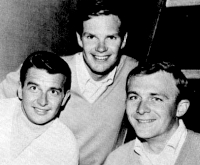
The Wellingtons were a folk singing group who performed the title songs for multiple television programs, including Gilligan's Island and Davy Crockett. They were also regulars on the television series Shindig!
The Wellingtons were formed by George Patterson. The group was originally called The Lincolns, and recorded for Kapp Records. As The Wellingtons, they were signed by Walt Disney to record the theme song for Disney's The Wonderful World of Color.
Gilligan's Island producer Sherwood Schwartz had his pilot episodes for the show rejected twice and decided he needed a new theme song. Working with composer George Wyle he came up with a folk song that told the back story of the castaways, and hired The Wellingtons to sing it. The song was a hit. The Wellingtons appear in a second season (1965-66) episode as a rock group called "The Mosquitoes." Not only is the insect-named moniker a play on The Beatles, but the members of the fictitious group are named Bingo, Bango, Bongo and Irving in a reverse play on the names John, Paul, George and Ringo.
The group traveled with star Donald O'Connor for six and a half years and also toured with The Supremes and Stevie Wonder.